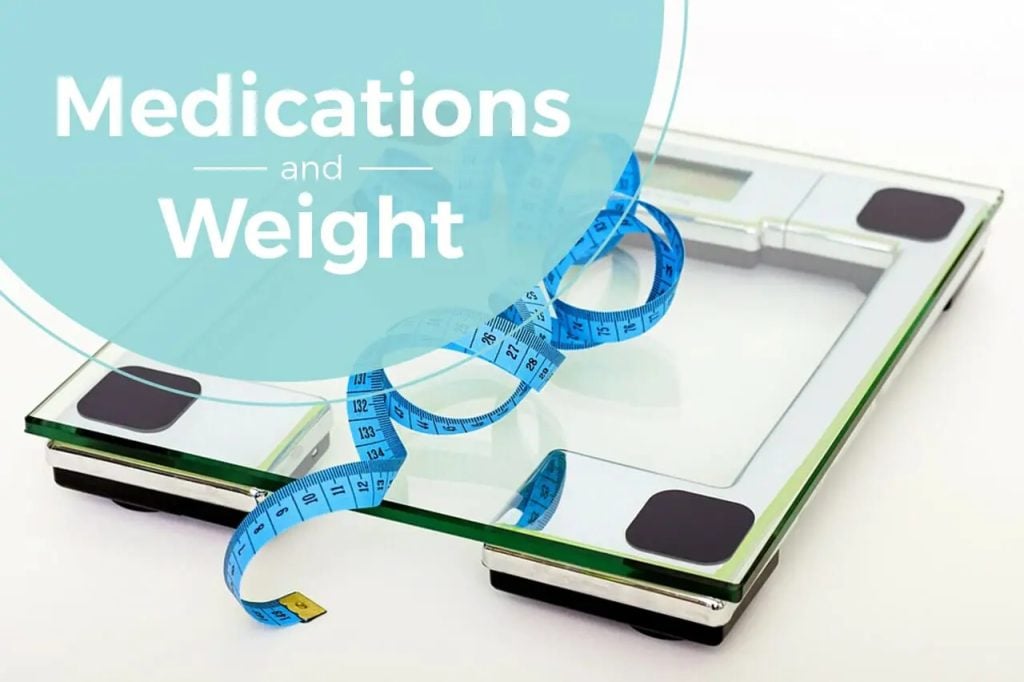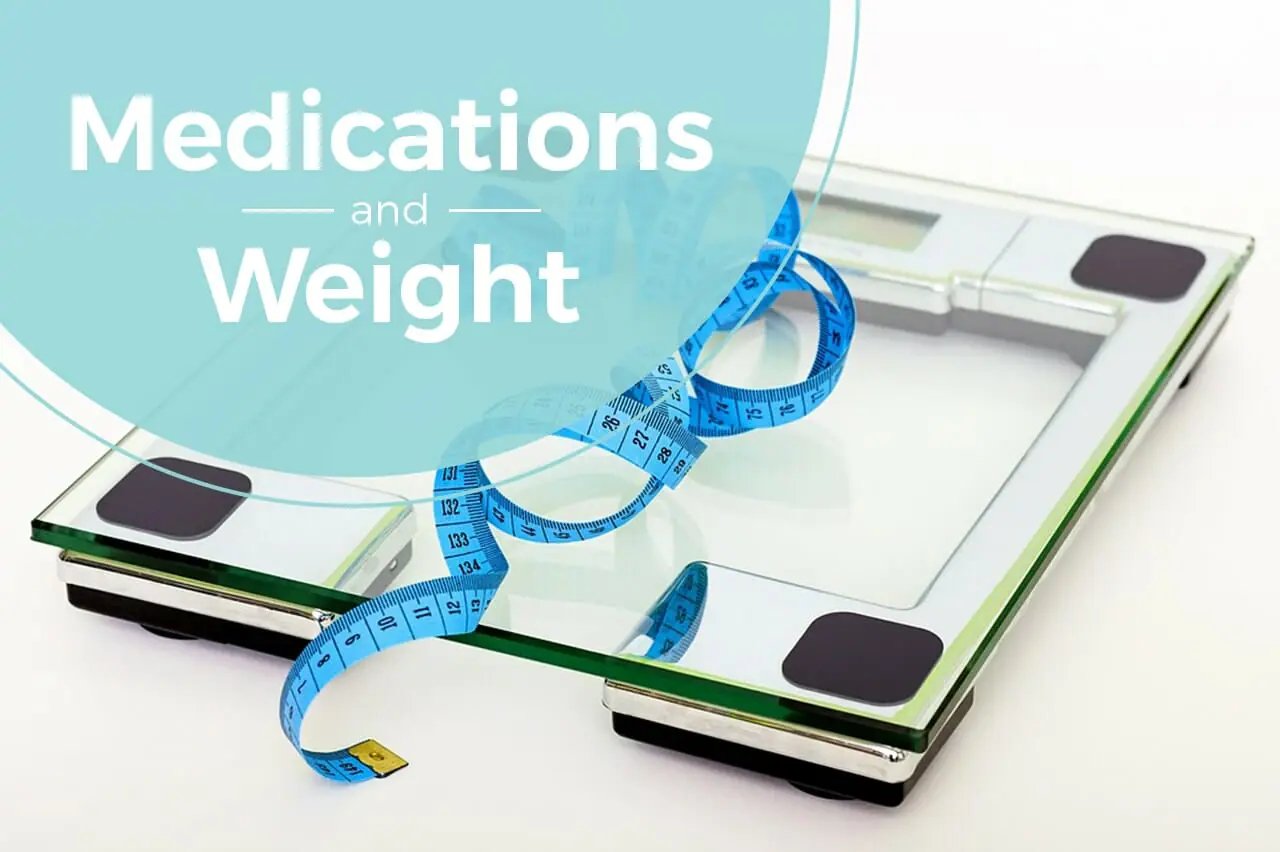
Disclaimer: The article below is general information and should not be taken as medical advice. If you’re taking one or more medications that is causing you to gain weight, it’s important that you consult with your doctor about any risks associated with stopping or changing your medication.
Can medications cause weight gain? You do your best to stay active and eat right, but you’re beginning to notice those extra pounds adding up. What’s in your medicine cabinet could be the reason.
Unfortunately, certain medications and weight gain go hand in hand. Many medications that are prescribed for diabetes, high blood pressure or depression come with weight-gain side effects. Other medications can increase your appetite or make you feel hungrier than you really are. And then there are those drugs that cause your body to hold on to excess fluids or slow its calorie-burning abilities. Regardless, medications are an under-recognized contributor to an already high rate of obesity problems in this country.
If you think you’re currently taking medications that are the cause of your weight gain, it’s important that you don’t stop taking them before you consult with your physician. These prescribed medications might just be keeping you alive. Your doctor may have to change your medication and might have one to prescribe that will also help you shed a few pounds. If there isn’t an alternative medication, your doctor can at least give you advice on how to offset your weight gain.
In this article, we’ll discuss why certain medications cause weight gain, what medications are known to contribute to gaining weight and what alternatives you might consider pursuing — or asking your doctor about — that might not contribute to weight gain and even may help you to lose weight.
Schedule a Weight Loss Consultation
Why Do Some Drugs Cause Weight Gain?
There can be a number of causes for medication and weight-gain side effects. As mentioned, some medications increase your appetite, which makes you eat more food and gain those extra pounds. Others have an effect on your metabolism, which makes your body slower at burning calories. There are also certain medications that have an effect on how your body absorbs and stores nutrients and sugars.
You might be taking a certain type of medicine that results in shortness of breath, which will likely cause you to exercise less and therefore gain weight. Your body may retain water, causing you to weigh more because of some medications even if none of the weight you gained is fat. And then there are medications that trigger weight gain, but research hasn’t shown the reason why.
With that said, below are particular medications that could cause you to gain extra weight. Keep in mind, these are only some of a number of medications that have this side effect, so if you’re taking a certain medication that is not listed here, consult with your doctor to see if you should have any concerns with it.
What Medications Cause Weight Gain?
There are a number of different medications that cause weight gain including the following, which we’re presenting here in their broad conditional categories.
Antidepressant Medications
Antidepressant medicine is designed to help alleviate depression. Taking certain selective serotonin reuptake inhibitors (SSRIs) like Paxil, Prozac or Zoloft makes you more prone to gaining weight. SSRIs work by blocking your brain’s receptor that reabsorbs serotonin. Serotonin is a feel-good chemical in your brain that sends certain messages between the cells of your nerves. This enhances your mood and makes it more positive. But it also may affect your appetite too, by making you crave carbohydrates.
Another class of antidepressants known as tricyclic antidepressants (TCAs) also increases your appetite and causes you to gain those unwanted pounds.
Common types of antidepressant medications that could lead to weight gain include:
- Prozac, or fluoxetine
- Paxil, or paroxetine
- Celexa, or citalopram
- Pamelor, or nortriptyline
- Zoloft, or sertraline
- Luvox, or fluvoxamine
- Elavil, or amitriptyline
- Remeron, or mirtazapine
Because Remeron is highly likely to cause weight gain, doctors often prescribe it to patients with AIDS or seniors who are underweight.
Alternative Antidepressant Medications
There are some antidepressant medicines that aren’t linked with weight gain. These include:
- Wellbutrin, or bupropion. This medication used to treat depression and help you quit smoking is one of the few antidepressants that is not associated with weight gain.
- Cymbalta (or duloxetine) and Effexor (or venlafaxine). Both of these are believed to have neutral weight effects.
- Contrave. This is a weight loss medication that is FDA-approved and may help some people who battle depression. It combines both naltrexone, which is a drug used in drug or alcohol addiction, and bupropion.
Diabetes Medications
Inhaled or injectable insulin is a common treatment for Type 1 and Type 2 diabetes. It stabilizes your blood sugar levels, bringing them down to regular concentrations. It also works as an anabolic hormone promoting protein, glucose and fat storage.
Its anabolic effect can cause weight gain, but you can counter this effect by being more physically active and eating healthy. Glipizide (or sulfonylureas), Actos (or pioglitazone), and other Type 2 diabetes oral medications which work by stimulating your pancreas into secreting insulin may also encourage weight gain.
Common diabetes medications that may contribute to weight gain include:
- Glucotrol, or glipizide
- Actos, or pioglitazone
- Amaryl, or glimepiride
- Prandin, or repaglinide
- Insulin
- Micronase/Diabeta, or glyburide
- Starlix, or nateglinide
Some weight gain is normal when you first begin to take certain diabetes medications while your body is adjusting to them. However, with some types of diabetes medications, particularly the older ones, they exhaust calories into fat cells. When you have Type 2 diabetes, you likely already have a little extra weight, so it can be frustrating when your medication adds on additional weight.
Alternative Diabetes Medications
There are some alternatives you can talk with your doctor about if you are struggling with weight gain. A couple include:
- Metformin. This is a medication you take orally for Type 2 diabetes to control your levels of blood sugar. Occasionally, doctors will combine it with other medications like insulin. It doesn’t have the weight gain side effect like other diabetes medications.
- Incretin Mimetics, or GLP-1 Agonists. This is an injectable drug that is relatively new and is used for treating Type 2 diabetes. Doctors typically prescribe this medication when oral medications aren’t effective in controlling your condition. Incretin mimetics work by mimicking GLP-1 action and stimulate insulin release. When compared with placebos, studies have shown to actually help you lose weight when you combine them with exercise and diet. They help inhibit your food intake by enhancing satiety, which ultimately helps you keep your weight under control.
Mood-Stabilizers
These are psychiatric pharmaceutical medications prescribed for treating mood disorders like bipolar disorder or schizophrenia, promoting and sustaining intense shifts in your mood.
Common mood stabilizers include:
- Lithobid/Eskalith, or lithium
- Risperdal, or risperidone
- Clozaril, or clozapine
- Seroquel, or quetiapine
- Zyprexa, or olanzapine
They work by directly affecting your brain and can lead to changes in your metabolism and weight gain. They have been known to increase your appetite, causing people in some cases to gain as much as 11 pounds in only 10 weeks. When you take these regularly for a longer term, you could gain more.
Alternative Mood Stabilizer Medications
A couple mood stabilizing medications that don’t promote weight gain include:
- Lamotrigine. This is an anticonvulsant medication for treating bipolar disorder and seizures. This class of medication, with the exception of extended-release drugs, increases the length of time between depression and mania in bipolar disorder abnormal mood episodes. Some of these abnormal moods include abnormal excitement, frenzy or manic episodes. Lamotrigine not only has a lower risk of weight gain, but it may actually cause you to lose weight. In fact, in a clinical study, obese patients who took lamotrigine to treat their bipolar I disorder experienced weight loss.
- Lurasidone. This medication has a low risk of gaining weight as a side effect.
High Blood Pressure Medications
There are a number of blood pressure medications, also referred to as antihypertensives, that can be prescribed for hypertension or for lowering your blood pressure. These also vary in classes and types.
Diuretics are one example, and they work by helping your body to eliminate excess water and sodium while controlling your blood pressure. They may also be prescribed in combination with other types of high blood pressure therapies. Diuretics may help you lose temporary water weight, but they can also lead to weight gain because your body may become “thirsty” after taking them. Your brain can interpret your thirst for hunger, and you eat more correspondingly.
Some common diuretic medications may include:
- Diuril, or chlorothiazide
- Hygroton, or chlorthalidone
- Lozol, or indapamide
- Zaroxolyn/Mykrox, or metolazone
- Microzide/Esidrix/Hydrodiuril, or hydrochlorothiazide
- Lasix, or furosemide
Another type of medication for high blood pressure is blood vessel dilators, which commonly include Minoxidil (or loniten), and Hydralazine (or apresoline). Minoxidil is typically used only in patients who have a more severe case of high blood pressure since the drug is very potent. But it is known to cause marked weight gain through fluid retention.
Beta blockers are another common medication used to lower your blood pressure and slow the rate of your heart down to ease the stress on it. This also, however, decreases the reaction your body has to exercise, making it so you are burning fewer calories. They also cause you to feel tired, which makes you feel unable to work out and therefore causes you to gain weight.
Common types of beta blockers include:
- Tenormin, or atenolol
- Inderal, or propranolol
- Sectral, or acebutolol
- Toprol XL/Lopressor, or metoprolol
One side effect of some types of beta blockers is weight gain, particularly the older medications like Toprol-XL, Lopressor (or metoprolol), and Tenormin (or atenolol). However, they only cause around four pounds of weight gain on average.
Alternative High Blood Pressure Medications
- Coreg, or carvedilol. This medication, along with other newer beta blockers, typically doesn’t have the side effect of weight gain. You might gain a little bit of weight when taking these beta blockers in your first couple weeks, but your weight then begins to stabilize.
- Qnexa. Qnexa is an experimental medication for blood pressure and weight loss. It is a unique formulation of the anti-seizure medication topiramate and the appetite suppressant phentermine. Topiramate also lowers your blood pressure. It decreases your appetite while increasing satiety all day long since in its controlled-release form, phentermine will suppress your appetite quickly. So, the phentermine will begin its job instantly in suppressing your appetite, and when that part wears off and you begin to get hungry again, the topiramate starts taking effect.
Anti-Seizure Medications
Anti-seizure medicines like Depakene and Depakote (or valproic acid), treat seizures in epilepsy. This particular type of medication increases your appetite, causing you to gain 10 or more pounds.
Common anti-seizure medications include:
- Diamox, or acetazolamide
- Keppra XL/Keppra, or levetiracetam
- Onfi, or clobazam
- Fycompa, or perampanel
- Banzel, or rufinamide
- Tegretol, or carbamazepine
- Trileptal, or oxcarbazepine
- Aptiom, or eslicarbazepine
- Ativan, or lorazepam
- Rivotril/Klonopin/Epitril, or clonazepam
- Diastat/Valium, or diazepam
Medications that treat seizures have an effect on your hormones that controls your hunger, making it more difficult for your body to feel full. These medications lower your metabolism, increase your appetite and make your body retain excess fluids.
Alternative Anti-Seizure Medications
There are a few anti-seizure medications that may not provide you with weight gain. These are:
- Felbamate. One anti-seizure medication known as felbamate is used for controlling partial seizures when other types of treatments have failed. One side effect of this medication is weight loss. In fact, in a clinical trial, 65 participants who were suffering with seizures were given felbamate therapy as a secondary treatment. Out of these patients, 75 percent actually lost weight. Felbamate has also been reported to cause anorexia.
- Topiramate. This is another anti-seizure medication that can be used alone or combined with other medicines to treat epilepsy. Topiramate, brand name Topamax, is often prescribed by doctors to control purging and binging in order to promote weight loss in patients who are struggling with a type of eating disorder like a binge-eating disorder and bulimia nervosa. It’s not clear why this medication works for these types of disorders, but it’s thought it’s properties that control seizures and migraines also hinder your brain networks that cause food cravings.
- Zonisamide. The brand name for this medication is Zonegran, and it works as a carbonic anhydrase inhibitor and sulfonamide anticonvulsant for adults who are suffering with partial seizures from epilepsy. It’s also been shown to cause weight loss in obese patients when it’s combined with nutritional guidance and therapy, according to a small trial. This trial shows that a daily 400 mg dose of zonisamide combined with lifestyle counseling and diet enhances weight loss.
- Lamotrigine, Phenytoin and Levetiracetam. These are all thought to be weight neutral.
Migraine Medications
Migraine medications are available in two categories: acute treatment and preventative treatment. Acute treatment medications alleviate migraine symptoms while you are having one, where as preventative treatment medications work by preventing migraines. However, these medications have been shown to contribute to weight gain.
Common migraine medications include:
- Toprol-XL, or metoprolol
- Epival, or sodium valproate
- Elavil, or amitriptyline
- Paxil, or paroxetine
- Depakote, or divalproex sodium
- Ergomar, or ergotamine
- Sansert, or methysergide
- Migranal/DHE-45, or dihydroergotamine
- Methergine, or methylergonovine
- Wigraine, Cafetrate, Cafatine, Migergot, Cafergot or Ercaf — caffeine and ergotamine
Some of these migraine medications cause weight gain.
Alternative Migraine Headache Medications
If your migraine medications are contributing to weight gain, you might consider asking your doctor about an alternative, such as Topamax.
We mentioned that Topamax is used for treating epilepsy. However, it can help in preventing migraines and can reduce your need for immediate pain relief medications. It helps reduce the severity of a migraine and how many you get, but it doesn’t actually stop one if you already have one. This medication doesn’t cause weight gain like the other migraine-prevention medications like Depakote.
Contraceptives
There are a number of different contraceptives to eliminate the risk of pregnancy.
Common contraceptives include:
- Condoms
- Implants
- Sterilization
- The contraceptive pill
- Diaphragms
- IUDs, or intrauterine devices
- The morning-after pill
Contraceptives that you take orally or are injected have been associated with weight gain.
Alternative Contraceptives
Be sure to speak with your gynecologist or family physician if you’re thinking about switching contraceptives because of weight gain. Some alternatives you could investigate are:
- Ella or Plan B. This alternative contraceptive helps reduce your risk of getting pregnant when your commitment to abstinence fails and doesn’t have an effect on your weight.
- Progestin-only contraceptives (POCs). These are not shown to promote weight gain and could be used as an alternative.
Corticosteroids
Corticosteroids when taken orally, like glucocorticoids, and when used long-term and at higher doses can have weight gain side effects. These medications are used for treating arthritis and other painful inflammatory conditions as well as severe asthma.
Common corticosteroids include:
- Prelone/Orapred/Pediapred, or prednisolone
- Medrol, or methylprednisolone
- Prednicot/Deltasone/Sterapred, or prednisone
Steroids affect the rate of your metabolism and can cause an increase in your appetite and overeating.
Alternative Corticosteroids and Steroid Medications
Because corticosteroids can have marked weight gain effects, you’ll need to consider alternatives or practice lifestyle changes that may minimize or eliminate weight gain.
- Local injectable corticosteroids. These are used for inflammation in your spinal column or knee joints and don’t typically cause weight gain.
- Inhaled corticosteroids. Often prescribed for asthma, these are not known for causing significant weight gain.
Other than these options, most other corticosteroids do carry the risk of weight gain since they increase your appetite. Because of this, it’s important that you learn ways to control your appetite. Your doctor can work with you about ways to do this, and you can also make certain lifestyle changes to help with weight gain.
For instance, you can actually trick yourself into not feeling hungry by consuming low-calorie content and low-energy density foods, allowing you to consume the same weight of food daily but not the same amount of calories.
This might include foods like stews, soups, fruits and vegetables and other naturally high-water content foods, and other types of foods that absorb water while you are cooking them. Lower-fat and high-fiber foods are low in energy density. Avoid foods, when possible, that are higher in energy density and fat with less water content like peanuts, crisps, cheese, butter and biscuits.
It can be difficult to avoid weight gain when using steroids long term. However, diet and exercise can help.
Antiretrovirals
These medications are used in treating HIV. There are various types that work in various ways. Typically, HIV patients take three or more of these medications together, or they can be combined into a single pill. Unfortunately, they are also linked with unavoidable weight gain.
There really are no alternatives for these types of medications. Therefore, patients who are receiving antiretroviral therapy often have their weight and weight circumference monitored.
Allergy Medications
Many people suffer with allergies and require allergy medications like Allegra (or fexofenadine) and Zyrtec (or cetirizine) and other antihistamines which are linked with weight gain.
A 2010 study showed people who took antihistamines were more likely to be overweight. This is because it targets your H1 histamine receptor that, along with controlling your brain’s allergen response, also affects its appetite satiety systems. When this receptor’s activity is suppressed, it stimulates the appetite.
Common allergy medications include:
- Claritin, or loratadine
- Benadryl, ordiphenhydramine
- Zyrtec, or cetirizine
- Allegra, or fexofenadine
Allergy medications work by blocking histamine action, which is a chemical made by your body that causes a number of allergy symptoms. Antihistamines like Benadryl that block histamine can cause weight gain.
Alternative Allergy Medications
Most antihistamines have a side effect of potential weight gain. For that reason, you may want to consult with your physician about taking inhaled antihistamines, as these are antihistamines that don’t cause weight gain typically like most oral allergy medications do.
Medicine-Related Weight Gain Treatment
Your individual situation determines the treatment for medicine-related weight gain. Your doctor may switch you to a different medicine that doesn’t have weight-gain side effects, particularly if you have a lot of weight gain and it’s affecting your health.
In some situations, it might not be possible for you to stop taking a certain meds that cause weight gain. There may not be any other types of medication you can take for your particular symptoms. For this type of situation, never stop taking your medications if you’re gaining weight before talking with your physician.
Your physician can discuss other ways to control your weight, such as different weight loss treatments or lifestyle changes. Your doctor may refer you to a dietitian who will work with you to make better food choices and better eating behaviors. Exercising more can help you lose weight. You can also try eating your meals more slowly and limiting the sizes of your portions. If you suspect a certain medication you’re taking is causing your weight gain, it’s time to consult with your doctor or other weight loss specialist.
Contact Us to Get Control of Your Weight
Here at Synergy Wellness, we provide a number of different physician-supervised treatments for weight loss, in addition to medical aesthetics and body shaping. Here, you can enjoy weight loss in a discreet, spa-like setting with personalized service just for you. If you’re struggling with weight loss despite your best efforts, you may benefit from medical weight loss in beautiful and comfortable surroundings.
We’ll help you combat your hunger pains with medication and calorie-light, delicious meal replacements that are packed with nutrition. Our staff will treat you with compassion, respect and positivity while we’re helping you work on a slimmer new you. Call us at 661-878-9100 today to learn more about our California weight loss center.




